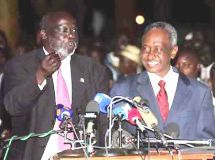Sudan, rebels make progress in talks on disputed regions: mediators
 NAIROBI, Dec 31 (AFP) — Sudan’s government and the main rebel group have made progress on three disputed regions at talks in Kenya aimed at ending two decades of war in the country, mediators said.
NAIROBI, Dec 31 (AFP) — Sudan’s government and the main rebel group have made progress on three disputed regions at talks in Kenya aimed at ending two decades of war in the country, mediators said.
Sudan’s Vice President Ali Osman Taha and rebel Sudan People’s Liberation Army (SPLA) head John Garang are locked in negotiations on the status of the three disputed areas of Abyei, southern Blue Nile State and the Nuba Mountains.
The SPLA claims those areas although they are not geographically part of the south, where the SPLA is based.
“The two sides have already agreed on some issues on the Nuba Mountains and southern Blue Nile, such as that they will become autonomous, have their own governor, supervise their own education, collect their own revenue,” a source who asked not to be named told AFP.
“On Abyei, the government wants a referendum while the SPLA wants it to return to the south, saying it was annexed, but the leaders are yet to discuss that,” said the source, who spoke to AFP from the talks venue in the Kenyan town of Naivasha.
Chief mediator Lazaro Sumbeiywo, a retired Kenyan army general, said it was “impossible to agree on a comprehensive peace agreement by the end of the year”.
“But they might agree on protocols on wealth-sharing and the three conflict areas (before midnight in Kenya or 2100 GMT),” he said.
The United States, meanwhile, said it had abandoned hope that both parties would meet a self-imposed end-of-year deadline for sealing a definitive peace deal.
“It doesn’t look like they’re going to get there today,” said a senior official in Washington. “But we’re hopeful for early next year.”
Khartoum and the rebels have already reached a rough agreement on the sharing of wealth, particularly oil revenues.
In 2002, Khartoum and the SPLA struck a breakthrough accord granting the south the right to self-determination after a six-year transition period and last September both sides reached a deal on transitional security, under which the government would withdraw its troops from the southern positions.
The war in Sudan, which erupted in 1983, is the longest on the African continent. It has pitted the south, where most observe traditional African religions and Christianity, against the Muslim, Arabized north.
The conflict has claimed at least 1.5 million lives and displaced an estimated four million people.
